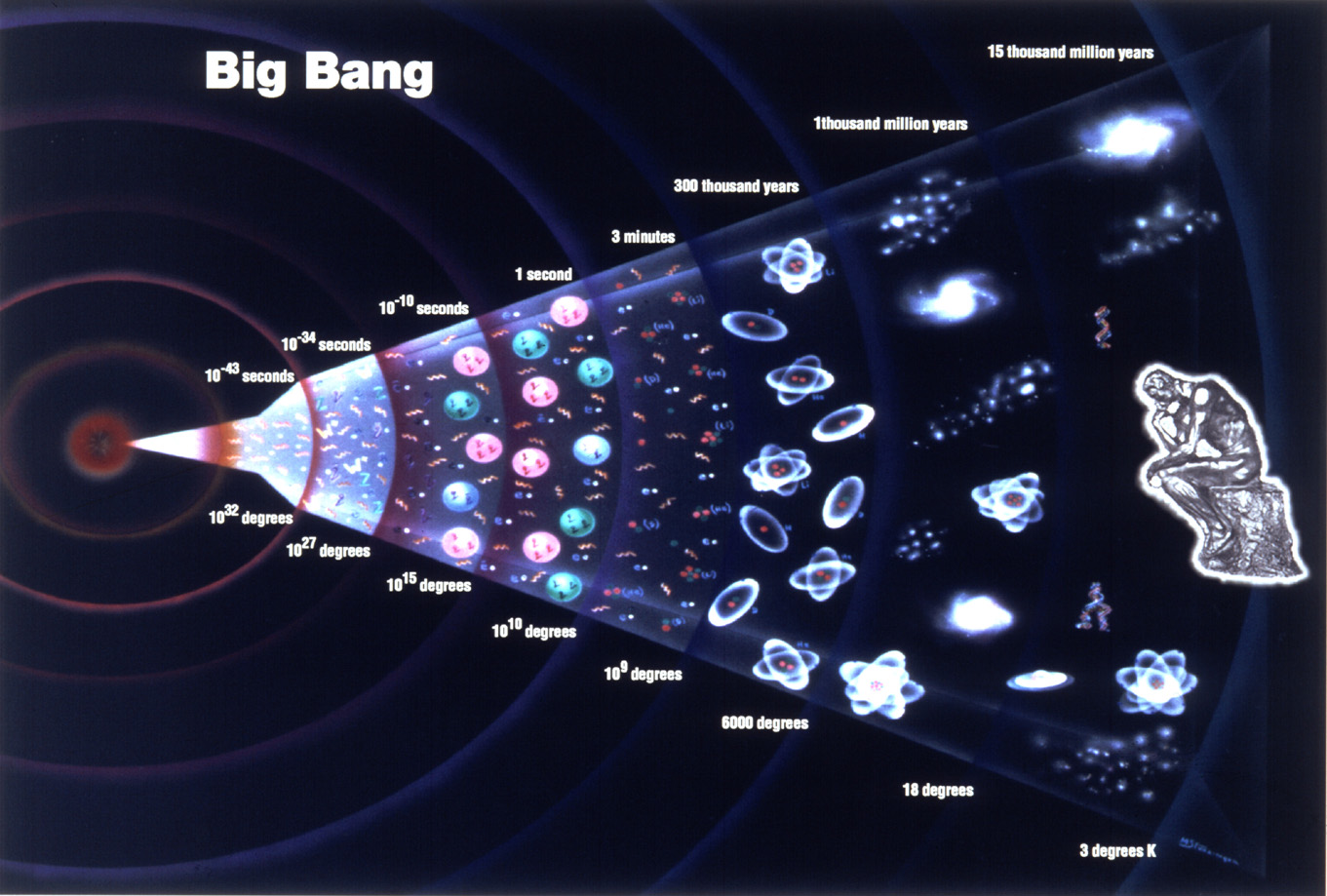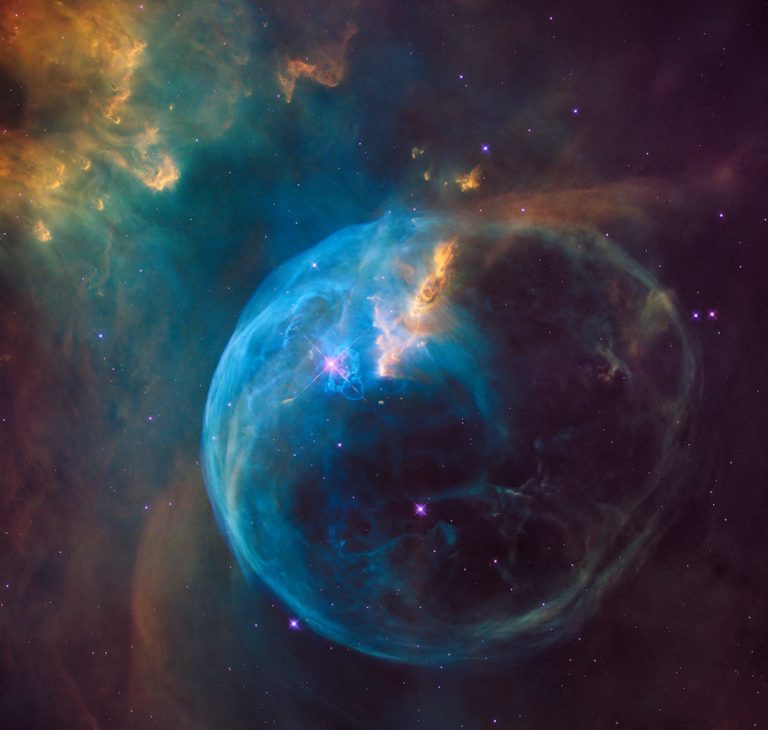
Entropy is as fundamental a law of physics as the fundamental forces of nature, that being: Strong and Weak Nuclear forces, Electromagnetism and Gravity. It is the motive force that drives the arrow of time. Viewing entropy from a different angle I would say that entropy is the interplay between matter and energy, matter cannot be effected and therefore disordered without energy, the real prime mover of motion and change and vice-versa. Energy needs matter to act upon so its effects can be manifested in reality. This article, as a philosophical commentary, is about the implications of entropy. Also to note, I’ve noticed that when nihilists do argue for the validity of their philosophy they invoke ‘nothing lasts all the time’ without naming the phenomena that is responsible! entropy!
An example of the implications of entropy, that I cannot resist to omit, is a quote on Nurgle, the chaos god of decay and disorder (entropy) from the Warhammer universe:
“Indeed, the very process of construction and creation foreshadow destruction and decay. The palace of today is tomorrow’s ruin, the maiden of the morning is the crone of the night, and the hope of a moment is but the foundation stone of everlasting regret.”
So young ladies I hope that you cherish every moment of your present youthful beauty since you may have a physique like Aphrodite but the inevitability of entropy will do a number on that. Bits here and there will start to sag and loosen and before you know it you will look like Meg Mucklebones from Legend because you see ‘the maiden of the morning is the crone of the night’
Even though Warhammer is just fiction, this sentence, I think, has good implications for entropy in philosophy. The implication being that it turns attention to and illustrates an important feature of reality: impermanence and the change and disorder that result from it. This is why modern nihilism can give a ruddy good clout in the philosophical arena by calling on the law of entropy.
I think, when entropy is brought into philosophy it becomes, a sort of, modern Heraclitean philosophy in the sense that reality is constantly undergoing a process of fluctuating change his well known maxim paraphrased;
“Everything flows and nothing remains still … and … you cannot step twice into the same stream.”
I argue with my first premise:
The Morphology of matter is not fixed
Current morphology – that is shapes, forms and structures – existing in the present will not keep their current morphology forever. The particles of matter condition form and extension of the objects we perceive, but the particles of matter never remains static. The disordering effects of entropy will continue even though we cannot perceive it, as this occurs at the microscopic level and because the human eye has a limited resolution of 100 micrometres. Some objects are so durable that it will take a long time to disorder, testing our patience in the mean time and more boring than watching paint dry! So the forms that we see in everyday life, people, animals, plants, structures e.g. will, given the passing of time, such as the passing of years, have their morphologies change gradually. Which is just another way of talking about the phenomena of aging; a most vivid idea we have of entropic processes. We can imagine the shifting morphology of the body, continually happening over the passing of years. Seniors on TV shows say “I’m not as young as I used to be’ surely we’ve heard that line on the television many times before in a show. We know that our senior is noticing a qualitative change that his body has gone through, he attributes it to the passing time, but really its all due to entropy. People may age chronologically the same as years are standardised measurements of time with NO VARIATION! However, on the physical side of things, people age at differing rates than other people. Compared to other bodies where that entropy is of a faster progression; aging slower means a lower state of entropy progression in the closed system that is the human body. Look at Jacques Fresco for someone over a century years old he’s aged well; he walks without the aid of a zimmer frame!
Have a look at a picture of yourself as a child, you don’t say it is me you say it was me as your morphology is very much different now than it was of back then.
The fact that you can remember yesterday but not tomorrow is because of entropy. The fact that you’re always born young and then you grow older, and not the other way around like Benjamin Button – it’s all because of entropy. So I think that entropy is underappreciated as something that has a crucial role in how we go through life. – Sean Carroll
The constituents that make up a living being or any object for that matter are always in motion, even when it cannot be justified with the naked human eye. These constituents making up living beings are atoms, the building blocks of ordinary everyday stuff. Atoms are constantly buzzing with kinetic energy – the energy of motion. For example, in solids, they vibrate in a stationary position kept in their place by adjacent atoms. Solids are the most ordered, relatively speaking compared to liquids and gases in which their atoms are at greater liberty to move about and around from one position to another. Having greater kinetic energies means theses states of matter are of higher entropic states, so the disordering behavior of atoms from their original position brings about a consequent change in the morphology of the objects which they make up. And that would be on a macroscopic scale; a level we are able to perceive.
Even on the macro scale of things the morphology of entire continents will change over time, the tectonic plates have been in constant motion for millions of years prior. Look below at how the tectonic plates have shifted and morphed over millions of years; a picture says a thousand words.

The continual shifting of the landmasses throughout many different ages provided new habitats that assisted evolution in flourishing. Not all disordering processes are an anathema to life as a whole. In fact it is required, as entropy can give opportunities for life to branch out into endless forms most beautiful, because is evolution not the change in the structural forms of life over time? Provided humanity is still around in millions of years from now, the continents will experience shifts in their morphology. The implications being that geopolitical relationships between countries and maps will have to be updated to reflect the changing reality; the land, millions of years from now will be unrecognizable.
In summary, I take the view that morphological change happens because of the accumulated rearrangements of the atoms that make up bodies or objects, the change in arrangements of its atoms is correlated with a change in the appearance of its form.
Nothing ultimately stands the test of time

The palace of today is tomorrow’s ruin, indeed it is, visit any medieval castle today and see how the keep and its battlements are worn away like the abrasions on wood by a filer, bit by bit being worn away. That is why the construction and civil engineering trades are always required to maintain the condition of all buildings lest the effects of weathering such as ice, acids, salt, plants, animals, and changes in temperature or earthquakes crumble them to ruins.
Venice is the perfect place for a phase of art to die. No other city on earth embraces entropy quite like this magical floating mall.
– Jerry Saltz
Artisans and artists build monuments and structures so that these edifices outlast them and stand the ‘test of time’. To become the posthumous crystallised extension of their ‘immortality’ in the form of a work; a reminder to those living that ‘this is my stamp on history’. The passions to be remembered as someone of status and importance drives them, even though, they will not experience the probable fame after their passing. This applies to all, not just artists and artisans, look at writers like Karl Marx and H.P. Lovecraft through their works they are famous and remembered but they can’t experience it they’re dead six feet under! But even being in the know that everything you do or create is susceptible to change/disorder this still does not deter us from pursuing our aspirations. We are not built like that spider in my bedroom waiting in its web for over 7 weeks for food, no, we find ourselves driven to do something with our allotted time lest we become existentially bored with an existence void of an immediate goal. Say thanks to those dopamine secretions in the mammalian brain for anticipating rewards, which is a naturalist take on why human beings are driven to do these things. Take comfort though that it is only your mind’s judgement that is responsible for the attachment towards importance to creating/acquiring objects for social approval.
If buildings and works of art last for thousands of years then what is to be made of those doings that people enact day after day. The everyday frivolous dramas throughout civil life you see on a Saturday night. Human activities and services can hardly to have been said to have existed at all, because they are actions which are perishable upon acting just like the passing impulse of a sine wave; they are of the same importance as their brief existential expression. All the daily labours of everyone has never and will never have any lasting existential presence in the future configuration of the universe.
The stoic philosopher Seneca,even though he was a man of antiquity; a man of his time. Didn’t need to understand the laws of thermodynamics to understand the principle of entropy, of impermanence and certain potential of all things towards degradation:
“The seven wonders of the world, and any even greater wonders which the ambition of later ages has constructed, will be seen some day leveled with the ground. So it is: nothing lasts forever, few things even last for long: all are susceptible of decay in one way or another.” – Seneca
Everything, any new form brought into the now whether its new life, or a new building or the crafting of a work of art will be acted upon instantly by entropy; the very process of construction and creation foreshadow destruction and decay. So as has been said earlier, nothing is built to last an infinite amount of time in a fixed state of being, When the prime characteristics of the universe is that of entropy being always restless and disordering matter. Will your creations outlast the time modern humanity has been in existence? which is at least now over 300,000 years? As the Moroccan fossils have recently shown? Saying that will the human species still be around another for another 300,000 years? A certain guaranteed prediction is that humanity’s existence in the future will be… uncertain. Seriously though, well, for one thing, that is for the future, we know that entropy will increase and will, I’m sure, have an effect on the way that we will harvest energy in the future as fossil fuels will get harder to acquire in the near future as the energy released from them cannot be recovered and in the far future be totally depleted.
On Knowing that something is finite gives it more value

I’ve seen things you people wouldn’t believe. Attack ships on fire off the shoulder of Orion. I watched C-beams glitter in the dark near the Tannhäuser Gate. All those moments will be lost in time, like tears in rain. Time to die. – Roy Batty
Tears in rain? sounds like a highly entropic disordered happening right there I can imagine the saline solution of the tears being ripped apart by the polarity of the water molecules… yes I know that is one way to ruin a classic monologue; but only one way mind you!
To touch on the Stoics, to give them credit, they were not deluding themselves that the nature of all is impermanence they talked about this in-depth even concerning their own lives and the brief moments we are here we should cherish and live life to the fullest; here are a couple of quotes they said:
“live as if each day were your last in life then hopefully you would not squander it on hedonistic and trivial activities.’
‘You are living as if destined to live forever; your own frailty never occurs to you; you don’t notice how much time has already passed but squander it as though you had a full and overflowing supply”
– Seneca
Same with what is external to us, we must cherish the objects that we already have because only when we lose something do we really care. So the stoic advice is to want what we already possess and appreciate that instead of wanting more objects. What the Stoics are doing here is accepting entropy and as many people come to the realisation that we take things for granted in their longevity there always follows an appreciation towards the object, now invested with greater importance in value and care upon realisation.
I can imagine a scenario that will suit Seneca perfectly, you get these typical examples with orphans in films, one day said orphan walks through the park and comes across another child with its mother and father and predictably so the orphan is reminded of his parental deprivation usually accompanied with weeping monologue. However if Seneca was there I would imagine he would impart his Stoic wisdom and say: “lad, right now that kid is enjoying the joint activities of having parents, while for you it’s been denied. Nevertheless, cherish this wisdom ‘nothing remains forever’. Aye, now it’s good but since a family is not an individual but numerous people who are interconnected, attached by each others’ company and love. One day one of them will die if not mum or dad then the child. It is inevitable that the family will have to suffer the bond that death does part. But you orphan, you will not go through that and are free because the attachment does not exist in the first place.”
On beings giving value to the finite as finite themselves
It isn’t knowledge on objects and experiences being cherished more because of the fact they are temporary that is the problem but it is the agency doing the cherishing itself. Now here’s the part where nihilism comes in invoking the law of entropy. How can sentience that gives subjective meaning to things, which this sentience is itself finite, of no lasting presence, be of any lasting ‘value’ The values, ideas, in short all aspects of sentient awareness from rudimentary lizard consciousness to the philosophical pondering of the tailless primates of man. All that in entirety that you impute on yourself, others and objects are not timeless they will shift into the void of nothingness because consciousness, values and ideas themselves are only expressed and so predicated on a body, a brain, a mind that will one day be no more, ceased to be. So when we die so will the consciousness, values and ideas that we held, even those espousing nihilist philosophy. We ourselves are of brief longevity and beings of fragile flesh that can be ended by an accident that we did not order come happening. So when we die, kick the bucket, so simultaneously is the destruction of our concepts, values, cherished things living and inanimate, knowledge and pain and pleasure.
“This parrot is no more. It has ceased to be. It’s expired and gone to meet its maker. This is a late parrot. It’s a stiff. Bereft of life, it rests in peace. If you hadn’t nailed it to the perch, it would be pushing up the daisies. It’s rung down the curtain and joined the choir invisible. This is an ex-parrot.”
A rock does not give value, a tree does not give value, and a puddle of water does not give value. It is life that has attained sentience that assigns value. In ‘assigning value, giving value’ you don’t change the object that receives your value its chemical structure and properties remain unaffected it can only be changed through entropy, through a law of physics embedded in reality. In truth it is only you that changes in the sense that you change your predisposition and attitude towards the object and not the object itself. What are the manifestations of ideas and thoughts? People? but reliant only to be expressed through a physical medium which is itself non-judgemental, absent of mind. You could be the voice of a certain Buddhist teacher conveying meaning to do good deeds for a fortunate rebirth or a liberal lecturing with indignation on your perceived structural inequalities in society from a megaphone, your voice is nothing more than a series of agitated layers of air, they are called longitudinal sound waves and objectively are mechanical waves. This phenomena is itself devoid of value it does not give judgements of what is good or bad, correct or incorrect and it is totally mechanical, being disturbed compression of air particles in a medium. It is not the voice but consciousness that understands language the purpose being the sharing of information. Entropy undermines consciousness with the death of the body, brain and mind.
Conclusion
Remember entropy is a process not a qualitative transformation. However entropic processes are responsible for things like death and it could be argued that on the contrary death is a process not a binary qualitative switch shift from life to death as maybe near death experiences could testify?
I always say, it is because of entropy that all individual life forms are passing sentient specks compared to cosmic timescale. However, life as a whole is durable and able to recover and adapt from ‘setbacks’ setbacks being events like ‘the great dying’ or the Permian extinction event which killed off 95% of all life. The endless forms of life is often too slow to keep up and adapt with the sudden ecological and environmental changes over time.
The arrow of time always progresses turned by the gears of entropy. At earlier eons the universe was in a less disordered state, the energy content back then was of different values and more ordered. Especially those resources we rely on that contain potential energy ready to be released, but upon their being released they become highly disordered and the act is irreversible. This ties into the law the entropy within the ultimate closed system; our universe. Cosmic entropy is always increasing with a qualitative shift from what was past to present, nothing being the same again and with, I must repeat, the universe being the ultimate closed system par excellence. When the universe reaches a point when no more entropic processes can happen, since there is no more sub atomic, atomic, molecular, compound, in short, no more matter to disorder. Then this marks the stage of the universe when maximum entropy is present and is known as the heat death of the universe.
Ultimately for nihilists, they must understand that it is about being at peace with the entropy and accepting that changes will happen in all our lives whether this is good changes or bad changes in life. No matter how much of a failure you think you are in life it doesn’t ultimately matter in the grand scale of the cosmos. Entropy is the antidote to jealousy because the successes of your rivals, though stinging to the ego in the present moment, you must realise that this too shall pass and the endeavours of the rivals, everything that they have laboured with heart and soul and sweat are predestined by nature’s law of entropy to fade away gradually or rapidly and ultimately perish as the end result. There is no lasting significance to the suffering nor to the idyllic and jubilant joy when the beings that originated and expressed these behaviors are no longer existentially…expressed!
As we close in to the end of the article your face may look like this after reading:

But fret not, as I emphasise the following quotes in bold, and take the absurdist perspective of Meursault, the main character of Albert Camus’ novel The Stranger:
“Gazing up at the dark sky spangled with its signs and stars, for the first time, the first, I laid my heart open to the benign indifference of the universe.”
In addition, there does not have to be tears in rain over things coming into being and going out of being because although in death consciousness is gone, the body remains and will dissociate and still have a role as apart of the workings of the entire universe and the plans that come with it through its laws. Indeed this can be summed up in a quote by Seneca.
‘It is of great consolation that it is together with the universe that we are swept along.’
-Seneca


This is a wonderful description of entropy for the popular audience. Thank you for sharing it. As a scientist who thinks about entropy a great deal in both the scientific and popular context, I would like to add the following. It is true that because the universe is ultimately a closed system, we must admit that the entropy of the universe can only increase and this tends to lead to nihilism. A less pessimistic but equally realistic interpretation is that “you must do work to create and maintain order.” This is true whether the goal is to freeze water into ice or teach a class of students to interpret a word in the same way or convince a group of people to adopt a concerted strategy aimed at addressing a common problem. I consider entropy the single most important concept in all of science and I applaud your efforts.
Thank you James. It’s always refreshing to come across other people who are aware of the great importance of entropy in science and its philosophical implications; however few they may be.
Entropy seems to come to all systems eventually, whether man-made or not. For example, entropy applies to matter and energy constructs, computer programming and yes, physical reality including applying to every human societal construct. Entropy (or the slow decay into chaos) seems inevitable. Nothing ever gets less complicated or improves being unattended, but always gets more complicated and worsens… which obviously requires more energy to sustain the older a system becomes. The older and more complicated something becomes, the more likely that complicated nature will devolve into something resembling chaos (or death), simply because there’s no way to continue to support the level of energy required to sustain it.
In society’s social and economic systems, for example, when chaos takes hold (example: a bankruptcy), that thing goes away. Humans with intelligence and creative minds and foresight can actively seek to actively reduce the entropy and stave off that inevitable entropic chaos for a bit longer. It’s also possible for humans to build in a much slower decay rate by adding active design features. The human ability to learn and grow, adapt and create, plan and be proactive gives us the uncanny ability and edge to understand where the entropy is and work around it or, in same cases, get rid of it (at least for a long, long time)… even if many humans don’t even know the word ‘entropy’.
Unfortunately, for all of those who wish to ward off entropy and, ultimately, stave off chaos, there are those who equally welcome its arrival, sooner rather than later. Some people may even foolishly believe that they can benefit from the faster arrival of entropy, such as Donald Trump. His nihilism and lack of vision actually prevents his ability to fully grasp or understand the concept of entropy, and thus he has pushed America much closer towards an end that sees our destruction… all because his views lead him to believe he’ll be personally better off at the end of that path. Yet, the rest of the world, maybe even humanity itself, will not be better off. Nihilism, entropy and chaos seem to go hand-in hand, especially when dealing with complex human systems like government and the economy. Donald Trump’s reckless and careless embracing of entropy and chaos is an existential danger to us all. Yet, we may also be helpless to stop him because our system seems allow him get around consequences, which is probably a form of entropy itself. There are also those of his followers who actively seek to protect him and his vision, even though it may also inevitably lead to their own personal demise sooner rather than later.
[…] Mar 19 2017 […]